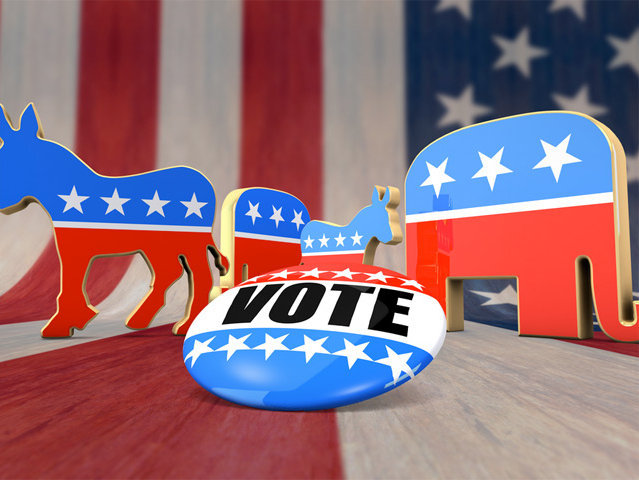Praise be that election day is finally over and we can get on to television that’s just slightly less mind-numbing than the candidate commercials we have been swamped with.
We’ve got four more years of Scott Walker until he decides to run for president and we probably are done with Mary Burke as a candidate. We are going to back to the way things have always been and some people are going to be angry and some people are going to be happy and a whole lot of people don’t really give a hoot one way or the other.
The big problem we face now is not so much that we’ve got more Walker but that big group of people who don’t give a hoot.
Everyone is talking about the roughly 56 percent of the registered voters as some kind of wonderful record. Pardon me but what I see there is that nearly half the eligible voters in Wisconsin didn’t even bother.
You could blame candidates for that, saying that nobody was inspiring enough to convince people to vote. But if we are going to depend on inspiration from politicians to run our democracy we’re in worse trouble than I thought.
I think it’s shameful that so many people didn’t vote, and I think there is a wonderful opportunity for Wisconsin to take the national lead in the kind of meaningful voter reform that would put that stupid voter ID thing to shame. I mean we could have the rest of the country looking at us with envy, and I think that’s a good thing.
The first thing I would do is make voting mandatory in Wisconsin. There are dozens of countries that have mandatory voting and it works better in some than in others. But we could do it here. Create some kind of penalty, like a $20 ticket, if people don’t vote and don’t have a good excuse for why they didn’t vote.
The Pew Research Center recently conducted a study to identify the people who don’t vote in this country.
"Nonvoters are younger than the typical voter, less affluent, have less formal education and are more racially diverse. Essentially, they are the picture of someone who needs to vote the most. Thirty-four percent are under 30, and 70 percent are under 50. Forty-three percent are members of a minority group. And what these nonvoters have less access to—universal health care, a strong social safety net, family-planning resources, an increased minimum wage, solid public schools and better options for student loans—are the same things that are constantly under threat of being cut or denied in the name of ‘fiscal responsibility.’"
I know that there are going to be people who say it violates some kind of right if voting became mandatory. But there are a lot of mandatory things, like ury duty, paying taxes, having a license to drive a car, being 18 to vote.
From a publication called "Political Cheat Sheet" I got this cogent explanation.
"Proponents of compulsory voting claim that the institution of democracy is far too important for citizens to fail to participate. That argument has resonance in the United States, where voter participation has averaged below 60 percent in every single election since 1968 — even falling to 57.5 percent of eligible voters in the 2012 presidential election — while the public’s faith in Congress has sunk to a new low of 7 percent, and President Barack Obama’s approval rating stands at a less-than-impressive 41 percent.
"In the United States the problem is not only that voter turnout is low but that it is socially biased, as well. Those Americans who fail to vote are typically already disadvantaged, and this means voting power is concentrated in the well-off demographic.
"Low voter participation is not the only problem with the American democratic voting system. But the second issue — increasing political polarization — is closely related. Low voter participation means that only those citizens with strong ideological convictions go to the polls. And with shrinking numbers of participating voters, those with divergent and extreme philosophies create a partisan political climate in which little is accomplished legislatively."
That pretty much makes my case for mandatory voting.
Along with that, however, I would like to see our state take the lead in making it easier to vote. Just think of the word "computer." Somebody obviously has a way to make it secure and easy to vote by computer. And why do we always have to have voting day in the middle of the week? We could open voting a full month before election day and allow people to vote in person and online.
Voting reform is a big deal to Republicans, and Democrats also talk about it. Let’s make them put their money where their mouths are and put our state on the cutting edge of voting reform that really means something to a democracy.
With a history in Milwaukee stretching back decades, Dave tries to bring a unique perspective to his writing, whether it's sports, politics, theater or any other issue.
He's seen Milwaukee grow, suffer pangs of growth, strive for success and has been involved in many efforts to both shape and re-shape the city. He's a happy man, now that he's quit playing golf, and enjoys music, his children and grandchildren and the myriad of sports in this state. He loves great food and hates bullies and people who think they are smarter than everyone else.
This whole Internet thing continues to baffle him, but he's willing to play the game as long as OnMilwaukee.com keeps lending him a helping hand. He is constantly amazed that just a few dedicated people can provide so much news and information to a hungry public.
Despite some opinions to the contrary, Dave likes most stuff. But he is a skeptic who constantly wonders about the world around him. So many questions, so few answers.







